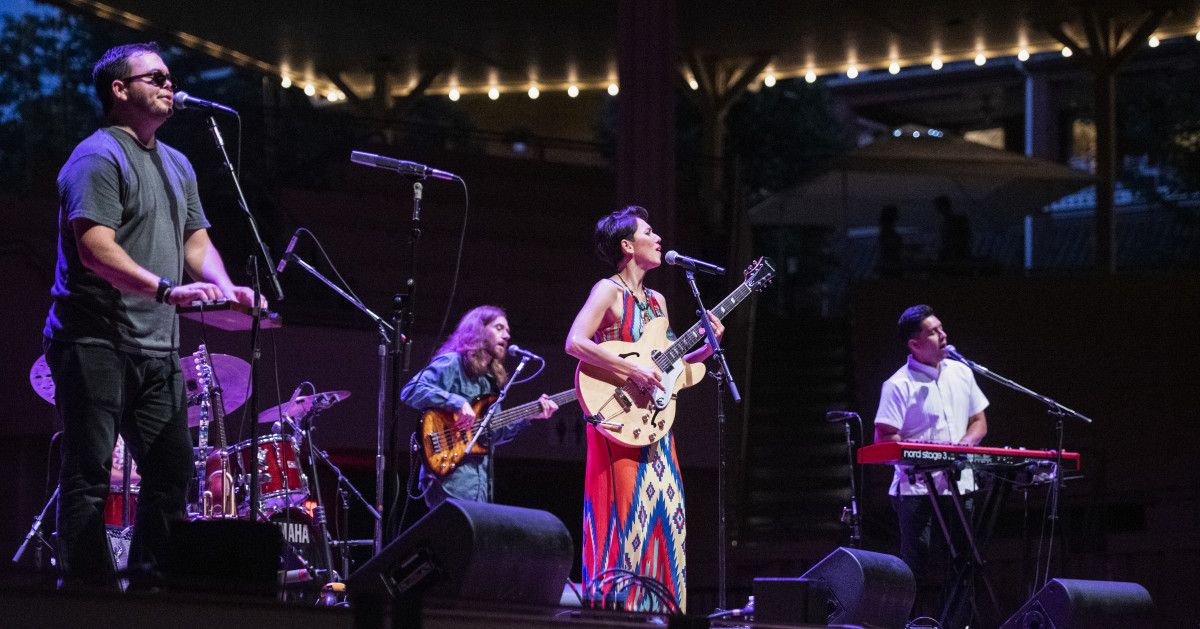If Gina Chavez had to describe her music in one word, it would be movimento — movement.
And when she performed at Chautauqua Institution for the first time in 2019, that’s exactly what she brought with her.
“We got people to dance,” Chavez said. “And then the security didn’t know what to do, because I guess they wanted to keep people out of certain areas. And I was like, ‘Just let them dance!’ ”
Chavez will perform at 8:15 p.m. Monday, July 18, in the Amphitheater, marking her third time performing for a Chautuauqan audience and the second time in person (she gave a CHQ Assembly performance in 2020). She replaces the previously announced Ukrainian Chorus Dumka of New York.
Although Chavez always loved to sing, she first discovered her talent for music when she joined choir in sixth grade. She has come a long way from the school choir, as she was a 2020 nominee for a Latin Grammy for Best Pop/Rock Album. Since the beginning of her career, Chavez has also won an Austin Music Award 12 times and has reached more 1.3 million views on her NPR Music Tiny Desk Concert on YouTube.
Chavez said that her voice saved her. She tends to lift others above herself but, she said, her voice has helped her to overcome that.
“I tend to be the kind of person who very easily makes my own voice small. But I have a big voice, a big singing voice. And so I think in a lot of ways, I’ve realized, ‘Wow, if I hadn’t had a voice that people wanted to listen to, I don’t know where I’d be or what I’d be doing,’ ” she said. “… What a blessing to have been given a voice. And, as a result, it’s such a gift to be able to share it.”
Chavez’s music incorporates multiple genres, such as Latin rock, folk and bossa nova. Her musical inspirations reflect the diversity of her own music, with inspirations including Brandi Carlile, Emily King and Calle 13. Though her music is eclectic, she aims to unite people through it. Chavez’s identity, which encompasses being biracial, queer and Catholic, shines through in different aspects of her music. She hopes people can relate to at least part of her story.
“I want to build bridges with music, and … if I have a superpower, that’s what it is: that I’m the kind of person that I have a lot of intersectionalities,” Chavez said. “I think as a result, I find that people maybe feel comfortable with me, or … can find themselves in parts of my story, or parts of my music. And as a result, I’d like to think that that helps bring different types of people together.”
Two of her favorite songs that she has written are “La Que Manda” and “The Sweet Sound of Your Name.”
Chavez described the process of creating “La Que Manda” as a moment when she got “to be the instrument instead of the creator.”
She was struggling with the melody, so she entered the studio, played the instrumental track, and screamed until she found the track’s sound.
“It’s like something new, but also kind of ancient, if that makes sense,” she said. “It feels very elemental. I feel like I’m standing barefoot on the ground, you know, 3,000 years ago, just screaming into the wilderness.”
“The Sweet Sound of Your Name” is a softer, acoustic track that acts as a love letter to her wife.
“It was (written) at a time when neither of us thought that we could really be together because we were Catholic. And so it was kind of this ‘I love you, but I can’t have you’ song,” Chavez said. “It’s beautiful to sing that to her knowing that we’ve been together for 16 years now and have gotten to walk some beautiful paths together.”
Since her 2019 Chautauqua performance, she said she has grown as a performer, and is excited to share that with her audience tonight.
“I’m bringing you my best self, so I’m very excited to take people on a journey, as we always have, through different sounds, through parts of my story, emotions, parts of the world,” she said. “But (it will be) definitely a next-level performance.”
She hopes that the performance offers people a new perspective and encourage open-mindedness. Given theWeek Four theme “The Future of History,” Chavez was reminded of “the idea that history is written by the winners, those in power.” Along with her goal of uniting people, she hopes to uplift different kinds of voices.
“I do think that history repeats itself,” she said. “And my hope is that we can step in and start making room for the voices — not that have not been speaking — but that we haven’t had the ears to hear, and that we would have the ears to hear other and more voices.”





